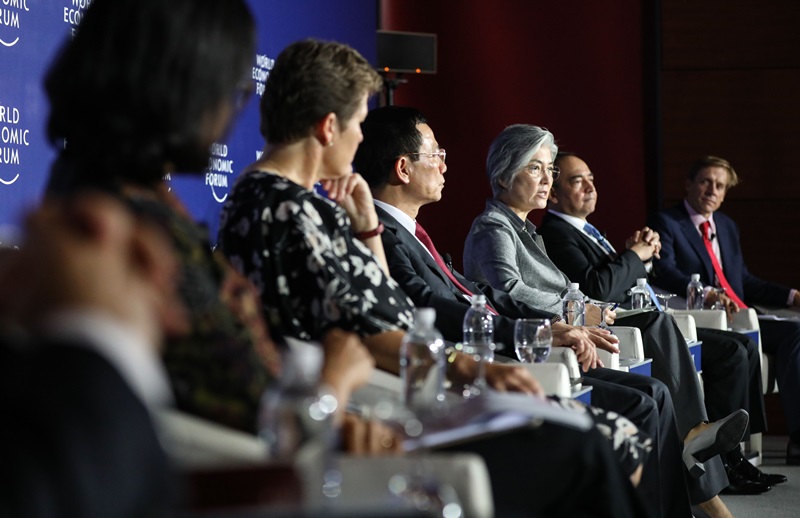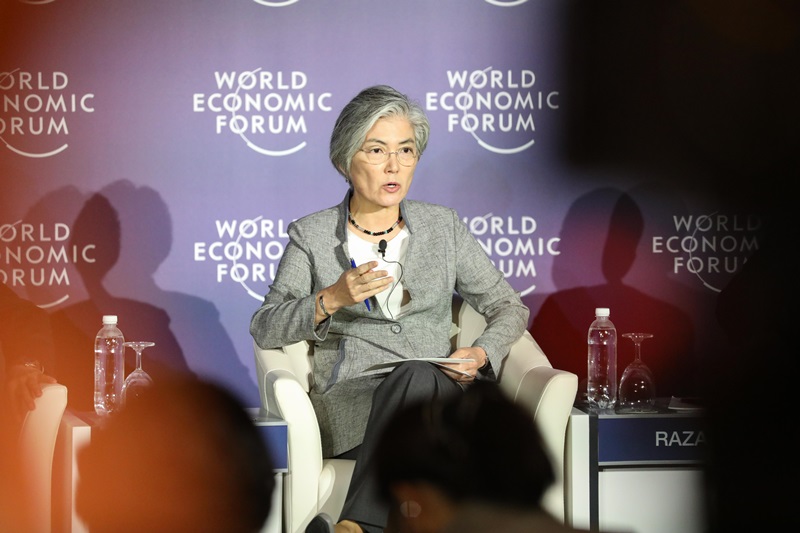-
About the Ministry
About the Ministry
- Press
- Countries & Regions
- Policy Information
- Life In Korea
Minister
- Notices
- Ministry News
- Press Releases
- Press Briefings
- Speeches & Published Materials
- Newsletter Service
- Diplomatic White Paper
[Former] Joint Press Conference with WEF on ASEAN Co-Chairs
- Date
- 2018-09-12
- hit
- 5592


I'm very happy to be here with my distinguished co-chairs. As Foreign Minister of Korea, I'm here because of our policy to upgrade Korea's relations with ASEAN to a whole new level in terms of co-prosperity and peace, and all based upon our joint commitment to the people -- that the collaboration moving forward will have to benefit the people, in the end, who are (the) ultimate judges of all that we do.
I'm also here because of this focus on the Fourth Industrial Revolution. As you may know, Korea, as one of the most wired countries in the world, has a bit of a lead experience in dealing with the challenges of the digital transformation that the Fourth Industrial Revolution has triggered. So to explore ideas as we go forward towards co-prosperity and creating and sustaining the growth momentum in this age of the Fourth Industrial Revolution, will be something I will be looking into in discussions and in the forum sessions.
But of course we cannot have prosperity and sustained growth without peace. And as you know, peace in East Asia has had to deal with a vexing problem over the past seven decades because of this situation on the Korean Peninsula. The situation on the Korean Peninsula is one of a frozen conflict. The 1953 armistice has continued to define the relations between South and North Korea for the past seven decades. The armistice had stopped the guns but has yet to be replaced by a full peace treaty that will then define the legal relations between South and North Korea.
Furthermore, on top of that, over the past three decades, North Korea's nuclear and missiles development has advanced to become a serious, perhaps the gravest, security threat, not just on the Korean Peninsula and (in) the region, but the global community.
But now, through extensive diplomatic endeavors over the past year, under the new government of President Moon Jae-in, we have a very real chance to achieve North Korea's complete denuclearization and to establish lasting peace on the Korean Peninsula.
As you may know, South and North Korea have had two summits so far this year, and also, a first-ever US-North Korea summit, as you must know, here in Singapore in June. And in these summits, the top leadership of the three sides have agreed to work towards complete denuclearization on the Korean Peninsula, and also, to work towards, to start a peace process with the goal of achieving a peace treaty and a peace regime that will replace the current armistice regime. And the importance of these agreements is that they come at the top leadership level, not like the previous agreements on the nuclear issue that was worked through the working levels and ministerial levels. So we do have a historic opportunity to realize lasting peace and complete denuclearization on the Korean Peninsula.
At this point, we are preparing for another summit meetings between the South and North Korean leaders in Pyongyang next week, and certainly that will be another significant step forward towards our goal. Along this journey, ASEAN and its member states have been hugely supportive, and their continued support will be instrumental going forward.
We must maintain the unity of the message to North Korea, and that message is that they need to deliver on their denuclearization commitment, and they need to continue to work with South Korea in good faith to establish lasting peace on the Korean Peninsula. And if it does, it will be brought into this community of peace and co-prosperity that links Southeast Asia and Northeast Asia.
So that will be the key messages that I will want to share throughout the next two days. And lastly I would just like to thank WEF and the government of Vietnam for bringing us together to explore the challenges of the Fourth Industrial Revolution and how our countries and societies may take charge of this digital transformation that the Fourth Industrial Revolution has triggered, in ways that benefit our peoples. Thank you. /End/




